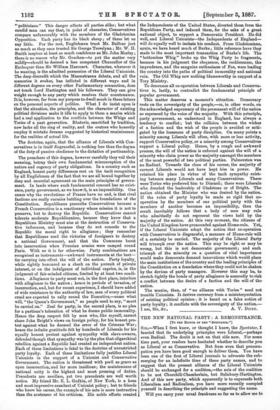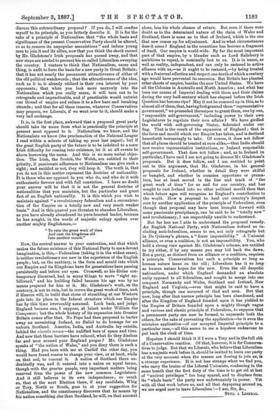THE NEW NATIONAL PARTY: A REMONSTRANCE. [To Ins Emma or
THE t'SpromOs.")
Sue,—When I first knew, or thought I knew, the Spectator, fancied that its underlying principles were Liberal,—perhaps- even Radical. The doubt is not on that side now. For some time past, your readers have hesitated whether to describe yon- as Liberal or as Conservative. But from even that preoccu- pation you have been good enough to deliver them.. You have- been one of the first of Liberal journals to advocate the sub- merging for an indefinite time of these party names, and to. suggest that the present alliance of the Liberal Unionists ehould be exchanged for a coalition,—the axis of the coalition to be not Churchill-Chamberlain, but Salisbury-Hartington. And of this new party, which apparently is to supersede both Liberalism and Radicalism, you have more recently occupied yourself in describing the principle and suggesting the name.
Will you carry your usual frankness so far as to allow me to discuss this extraordinary proposal ? If you do, I will confine myself to its principle, as you latterly describe it. It is for the sake of a principle of Nationalism that "the whole basis and significance of the present Conservative Party should be altered, so as to remove its unpopular associations" and induce young men to join it and its allies, now that you think the shock caused by Mr. Gladstone's Irish proposals has passed away, and that new steps are needed to prevent his so-called Liberalism sweeping the country. I venture to think that Nationalism, name and thing, is unfit to form the basis for a new party in Great Britain; that it has not nearly the permanent attractiveness of either of the old political watchwords ; that the attractiveness of the idea, such as it is, is already utilised in their own interest by your -opponents ; that when you look more narrowly into the Nationalism which you really mean, it will turn out to be -retrograde and impracticable, and if practicable would untwist our thread of empire and reduce it to a few bare and breaking strands ; and that for all these reasons, whatever Conservatives may propose, we Liberals, if we went over to it, should make a very bad exchange.
It is, in the first place, awkward that a proposed great party should take its name from what is practically the principle at present most opposed to it. Nationalism we know, and the Nationalists we know (the proclamation of the National League I read within a minute of taking up your last paper); but if the great English party of the future is to be indebted to a mere !Irish difficulty for coming into existence, let it at all events be above borrowing the name. And this is no mere verbal objec- tion. The Irish, the Scotch, the Welsh, are entitled to their priority, if passionate adherence to Nationalism can give such a right; and entitled or not, they will keep it. The truth is, that you do not in this matter represent the doctrine of nationality.
It is those who are opposed to you who do, and who do it with enthusiastic fervour and with full conviction. I have no doubt your answer will be that it is not the general doctrine of nationalities that you maintain, but the particular and great fact of an English nationality. It is this which you wish to maintain against "a revolutionary federalism and a reconstruc- tion of the Empire on a totally new and very much weaker basis." And in this quarrel you threaten to abandon Liberalism, as you have already abandoned its pure-hearted leader, because he has sought, in the words of majestic eulogy spoken over another mighty Englishman,—
" To rein the great work of time And oast the kingdoms old Into another mould."
Now, the central answer to your contention, and that which makes the future existence of this National Party to me a devout imagination, is this,—Federaliam (taking it in the widest sense), is neither revolutionary nor new in the experience of the English people ; hat, on the contrary, is the form and mould into which our Empire and its Kingdoms have for generations been passing persistently and before our eyes. Cromwell, as his divine con- temporary discerned, had in many things to move "right up- hillward," and his building failed because his age was by no means prepared for him or it. Mr. Gladstone's work, on the -contrary, is not to ruin, but to crown the great work of time, and, if Heaven will, to build that stone of stumbling at our Western gate into its place in the federal structure which our Empire has by this time irrevocably assumed. Look back, and judge. England became one, I suppose, at latest under William the Conqueror; but the whole history of its expansion into Greater Britain comes after that. No Pope had then proposed to barter away an unresisting Ireland, no Baliol to do homage for an unborn Scotland. America, India, and Australia lay outside, behind the vincula reran —the unlifted bars of space and time. And now that those barriers have relaxed, what do they disclose -far and near around your England proper ? Mr. Gladstone speaks of "the nation of Wales," and you deny there is each a thing. Had you been with me at Cardiff the other day, you would have found reason to change your view, or at least, while on that soil, to conceal it. A nation of Scotland there un- doubtedly was, and it entered into a union on equal terms,
• -though with the greater people, very important matters being reserved from the power of the new common Legislature. And it still believes in its own independence ; so much so, that at the next Election there, if any candidate, Whig or Tory, North or South, goes in at your suggestion for Nationalism, and the constituency discovers that he means by his nation something else than Scotland, he will, on that account
alone, lose his whole chance of return. But even if there were doubt as to the determined nature of the claim of Wales and Scotland, there is none as to that of Ireland, which is the one that now comes up for adjustment. And in what circumstances does it come P England in the meantime has become a fragment of itself. Our empire is world-wide. By far the most important part of that empire, by a blunder such as Lord Salisbury is ambitions to repeat, is nominally loot to us. It is in name, as well as reality, independent, and can only be restored to active alliance with us,—as it ought to be restored,—by being treated with a fraternal affection and respect one-tenthof which a century ago would have prevented its secession. But Britain has planted other shoots of empire, besides the now United States. We have all the Colonies in Australia and North America ; and what has been oar course of Imperial dealing with them and their claims during the very half-century which has elapsed before the Irish Question has become ripe? May it not be summed up in this, as to almost all of them, that, having first granted them" representative government," we proceeded thereupon to grant them, one by one, "responsible self-government," including power to their own Legislatures to regulate their own affairs ? We have girdled the world with eelf-governing States, federated under our flag. That is the result of the expansion of England; that is the form and mould which our Empire has taken, and is destined henceforth increasingly to take. Of coarse, it does not follow that all places should be treated at once alike,—that India should now receive representative institutions, or Ireland responsible self-government. That does not follow ; and, as to Ireland in. particular, I have said I am not going to discuss Mr. Gladstone's proposals. But it does follow, and I am entitled to point out in this argument, that Mr. Gladstone, in his general proposals for Ireland, whether in detail they were skilful or bungled, and whether in occasion opportune or prema- ture, has at least moved in the line and track of "the great work of time " for us and for our country, and has sought to cast Ireland into no other political mould than that which future ages will recognise as England's contribution to the world. How a proposal to heal our country's deepest sore by another application of the principle of Federalism, even though that proposal may have been brought forward with some passionate precipitancy, can be said to be "totally new" and revolutionary, I am respectfully unable to understand.
But far less am I able to understand the proposed remedy. An English National Party, with Nationalism defined as in- cluding anti-federalism, seems to me, not only retrograde but in De Quinoey's phrase, a "fierce impossibility." A Unionist alliance, or even a coalition, is not an impossibility. Yon, who hold a strong view against Mr. Gladstone's scheme, are entitled to try either, if by any means you may bid back the dawn. But a party, as distinct from an alliance or a coalition, requires a principle. Conservatism has such a principle so long as human nature leans on the old ; Liberalism has it so long as human nature hopes for the new. Even the old despotic nationalism, under which England demanded an absolute unity opposed to all federalism, and sought to merge into one conquest Normandy and Wales, Scotland and Ireland, New England and Virginia,—even that might be said to have a principle, though one accursed of God and men. But that now, long after that narrow principle has been abandoned, and after the Kingdom of England founded upon it has yielded to the Empire of Britain founded upon a mighty though vague and various and elastic principle of Federalism, to suppose that a permanent party can now be formed, to supersede both the others, for the sake of preventing the application—be it even the mistaken application—of our accepted Imperial principle to a particular case,—all this seems to me a hopeless endeavour to put back the clock of time.
Hopeless I should think it if I were a Tory and in the fall ebb of a Conservative reaction. Of that, however, it is for Conserva- tives to judge. But that we Liberals, who believe that Liberalism
has a majestic work before it, should he invited to leave our party at the very moment when the masses are flowing to join us, is
a strange experience. It is not less strange when we find you, who carry the brains of the Liberal Unionists, confessing in the same breath that the first duty of the time is to get rid at last of "ancient privileges" too long spared, and to displace from its "whole basis" the party now unfortunately in power. Yet with all that work before us, and all that dayspring around us, we are urged now to leave Liberalism !—I am, Sir, &a.,
STILL A LD3EBAL.



































 Previous page
Previous page